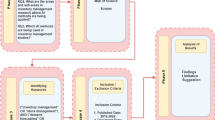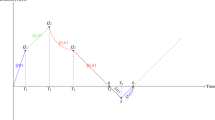Abstract
Suppliers’ offering delay payment terms to retailers can be regarded as a type of price reduction. In today’s ever competitive marketplace, offering delay payments has become a commonly adopted method to suppliers. Most of the inventory models with permissible delay in payments assumed that the entire lot size is delivered at the same time. However, in practice, goods ordered are usually arrived overtime in separate batches. In this study, we discuss an inventory problem with a finite replenishment rate under trade credit for two payment methods. We establish a theorem to find the optimal solution for each payment method. Numerical examples are also given to illustrate the solution procedure. Finally, to investigate the effect of changes of some main parameter values on the optimal solution, a sensitivity analysis is performed and some management interpretations are proposed.
Similar content being viewed by others
References
Aggarwal SP, Jaggi CK (1995) Ordering policies of deteriorating items under permissible delay in payments. J Oper Res Soc 46:658–662
Chang CT, Teng JT (2004) Retailer’s optimal ordering policy under supplier credits. Math Methods Oper Res 60:471–483
Chang CT, Ouyang LY, Teng JT (2003) An EOQ model for deteriorating items under supplier credits linked to ordering quantity. Appl Math Model 27:983–996
Chung KJ, Huang YF (2003) The optimal cycle time for EPQ inventory model under permissible delay in payments. Int J Prod Econ 84:307–318
Chung KJ, Liao JJ (2004) Lot-sizing decisions under trade credit depending on the ordering quantity. Comput Oper Res 31:909–928
Dave U (1985) On “economic order quantity under conditions of permissible delay in payments” by Goyal. J Oper Res Soc 36:1069
Davis RA, Gaither N (1985) Optimal ordering policies under conditions of extended payment privileges. Manag Sci 31:499–509
Goyal SK (1985) Economic order quantity under conditions of permissible delay in payments. J Oper Res Soc 36:335–338
Goyal SK, Teng JT, Chang CT (2007) Optimal ordering policies when the supplier provides a progressive interest scheme. Eur J Oper Res 179:404–413
Huang YF (2003) Optimal retailer’s ordering policies in the EOQ model under trade credit financing. J Oper Res Soc 54:1011–1015
Huang YF (2004) Optimal retailer’s replenishment policy for the EPQ model under the supplier’s trade credit policy. Prod Plan Control 15:27–33
Hwang H, Shinn SW (1997) Retailer’s pricing and lot sizing policy for exponentially deteriorating products under the condition of permissible delay in payments. Comput Oper Res 24:539–547
Jamal AM, Sarker BR, Wang S (1997) An ordering policy for deteriorating items with allowable shortage and permissible delay in payment. J Oper Res Soc 48:826–833
Liao HC, Tsai CH, Su CT (2000) An inventory model with deteriorating items under inflation when a delay in payment is permissible. Int J Prod Econ 63:207–214
Mandal BN, Phaujdar S (1989) Some EOQ models under permissible delay in payments. Int J Manag Sci 5(2):99–108
Ouyang LY, Chang CT, Teng JT (2005) An EOQ model for deteriorating items under trade credits. J Oper Res Soc 56(6):719–726
Ouyang LY, Teng JT, Chen LH (2006) Optimal ordering policy for deteriorating items with partial backlogging under permissible delay in payments. J Glob Optim 34:245–271
Sarker BR, Jamal AM, Wang S (2000) Optimal payment time under permissible delay in payment for products with deterioration. Prod Plan Control 11:380–390
Shah NH (1993a) A lot-size model for exponentially decaying inventory when delay in payments is permissible. Cah CERO 35:115–123
Shah NH (1993b) Probabilistic time-scheduling model for an exponentially decaying inventory when delays in payments are permissible. Int J Prod Econ 32:77–82
Stevenson WJ (1996) Production/operations management. Von Hoffman Press, New York
Taylor III BW (1999) Introduction to management science. Prentice-Hall, Englewood-Cliffs
Teng JT (2002) On the economic order quantity under conditions of permissible delay in payments. J Oper Res Soc 53:915–918
Teng JT, Chang CT, Goyal SK (2005) Optimal pricing and ordering policy under permissible delay in payments. Int J Prod Econ 97(2):121–129
Author information
Authors and Affiliations
Corresponding author
Rights and permissions
About this article
Cite this article
Cheng, MC., Lou, KR., Ouyang, LY. et al. The optimal ordering policy with trade credit under two different payment methods. TOP 18, 413–428 (2010). https://doi.org/10.1007/s11750-008-0062-3
Received:
Accepted:
Published:
Issue Date:
DOI: https://doi.org/10.1007/s11750-008-0062-3




